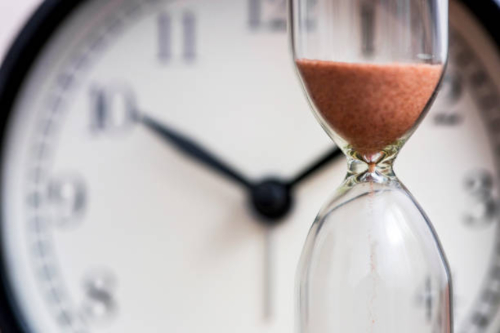 Slow Play Guidelines Slow Play Guidelines |

Here are some good common-sense guidelines compiled from a number of suggestions from clubs and articles on Slow Play:
- Arrive on time, i.e., at least 10 minutes early, so that we are all sitting at the tables and ready to start play at the set time. Apart from being able to begin promptly, this is important because the director must decide on the movement and the number of boards on each table before play starts, and this depends on the number of tables in play.
- If you arrive within 5 minutes of game time, please do not necessarily expect still to be accommodated, since the movement will probably already have been set up.
After game-time, it is too late, unless there happens to be a half table which can be made into a full table without changing the movement.
- For GB- shuffle and deal the cards when you arrive at your table. For S2- do not shuffle the cards. We are using pre-dealt hands from The Common Game. Apart from helping us to get going more quickly, the advantage of this is that there are printouts of the hands that will be e-mailed to you shortly after the game.
- Keep up to a reasonable speed with your bidding and play. We allow 10 minutes per board rounds for GB and 8 minutes per hand for S2, which is normally plenty. If you finish a round late, please make every effort to catch up during the next one. If your opponents arrive late at your table, for whatever reason, all four of you are responsible for trying to catch up.
- Before the opening lead: Once the bidding is over, the players should write the contract down now on their personal score sheets - except the player on opening lead, who should lead first. Likewise, dummy should table the cards before putting your bidding cards away or writing the contract on your score card.
If you see someone beginning to write down the contract before making the opening lead, remind them politely that they should lead first so that everyone else can be getting on with the hand.
- You can ask the opponents to leave the bidding cards out for an extra moment while you process the bidding. Don’t be the person that asks for a review of the auction, 10 seconds after the bidding cards are put away.
- Wait for the Director to announce the move.
- Please do not start your last board if there is less than four-minutes left in the round. Call the director who will normally award an average on the board unless one pair was clearly at fault.
- We all must stop and think sometimes, but if your problem is that you’re simply not sure what to do, please try not to take too long over making a call or playing a card. You must make a decision at some point! Your partner should feel free to give you a gentle nudge if you are taking too long over a decision.
- Please keep conversation to a minimum until you have finished playing all the hands for each round. Don’t analyse each hand as it finishes. If there is still time at the end of the round, when all the scoring has been done, then have a post-mortem, but in a low voice so that neighbouring tables can’t hear. When the move is called, please move promptly.
- South and West can be jointly responsible to keep a half an eye on the Timer and if necessary, keep the whole table moving along, or try to prevent outbreaks of conversation if time is running low.
- Please don’t leave the room between rounds if you can at all avoid it. The time to get coffee or wash hands is when you are sitting out or dummy. Don’t keep your next opponents waiting. It isn’t fair to them. The absolute worst time to wander off is when the timer has gone for the end of the round, and you can see that your next opponents are going to be late. They may be about to claim, will arrive at the table and find you are gone.
- If you are waiting for boards from the next table which is still playing, please ask one of the pair who has just left your table to pass you the board the next table has finished with.
- If, as declarer, you can see that you will definitely win all the remaining tricks, or a definite number of the remaining tricks, please claim, but in doing so remember that you must make a statement as to how you will play the rest of the hand, and this must include a reference to how you will handle any trumps still held by the defenders (otherwise they can argue that you had forgotten they were still out). Equally, as defender, if it’s totally obvious that your side will win (or lose) the last, say, two or three tricks, please make a claim (or concession).
- Claiming: Many players are nervous about claiming. Don’t be: the Laws encourage declarer to claim as soon as the outcome of the hand is clear. It’s no disgrace to get it wrong sometimes. If you're on defence and you can see that dummy is good (and you know that partner cannot win another trick), concede. It saves time.
- If a particular table or pair keeps holding you up, draw the director’s attention to it at an early stage so that he can keep an eye on the potential problem. The director cannot be expected to see everything happening in the room!
- When the board is over, if you are North, put the contract and result down in the Bridgemates first, before your own personal score sheet, then have East or West confirm it. You are North, you have the power to set the pace at the table.
- If you are still playing when it is time for the next round and someone at the next table asks for a board, be gracious and supply it promptly. There's no reason to make that table wait unnecessarily.
- Conversely, if the new round has started and you have not received your boards, don't be shy about asking the next table or someone standing close by to give you a board. No need to delay the start of play at your table.
None of these tips requires you to improve your bridge skill; they are simple, thoughtful, and efficient ways that only require mindfulness on your part. Remember that everyone is responsible for the pace of the game, and even if you are following the slowest pair in the room and are forced to start 5 minutes late, you should still make the effort to finish within the allotted time. It will make for a more pleasant game for everyone.
..... see less
Here are some good common-sense guidelines compiled from a number of suggestions from clubs and articles on Slow Play:
- Arrive on time, i.e., at least 10 minutes early, so that we are all sitting at ..........
..... see more |
|
|
|
 Slow Play according to the ACBL Slow Play according to the ACBL |

Failure to finish on time can do a great deal to chase players away from the game and is extremely distressing to waiting players. Bridge is a timed event. If a pair takes more than their share of the allotted time for each round, they are inconveniencing their fellow competitors as well as gaining an unfair advantage over them. When a pair has fallen behind it is incumbent on them to make up the time lost as quickly as possible whether at fault or not.
The actively ethical player makes a concerted effort to catch up when they have fallen behind, regardless of the reason for their lateness. All players are expected to develop this good habit.
Remember: Slow play is subject to penalty, and the penalties are well earned when slow pairs disrupt the normal progression of the game.
Additionally, players should be available to start each subsequent round promptly, avoiding wherever possible, being late to a table for non-bridge reasons.
At the discretion of the TD, slow play penalties will be deemed to be either disciplinary (and unappealable) or procedural.
“Slow play, as opposed to careful or thoughtful play, is discourteous to your opponents -- and to all other competitors as well. Players and pairs who take more than their allotted time are subject to penalty."”
"When a pair has fallen behind, it is incumbent on them to make up the time lost as quickly as possible whether at fault or not. All players are expected to make a concerted effort to catch up when they have fallen behind, regardless of the reason for their lateness.
In the absence of compelling evidence to the contrary, the director should presume that a pair finishing a round late by more than two or three minutes on more than one occasion during a session is responsible for the lateness.
There is a strong expectation that the director will penalize such a pair. The size of a penalty will tend to increase for subsequent instances of slow play and for chronic or egregious slow play."
..... see less
Failure to finish on time can do a great deal to chase players away from the game and is extremely distressing to waiting players. Bridge is a timed event. If a pair takes more than their share of the allotted time for each round, they are inconveniencing their fellow competitors as well as gaining an unfair advantage over them. ..........
..... see more |
|
|
|
|
|
|